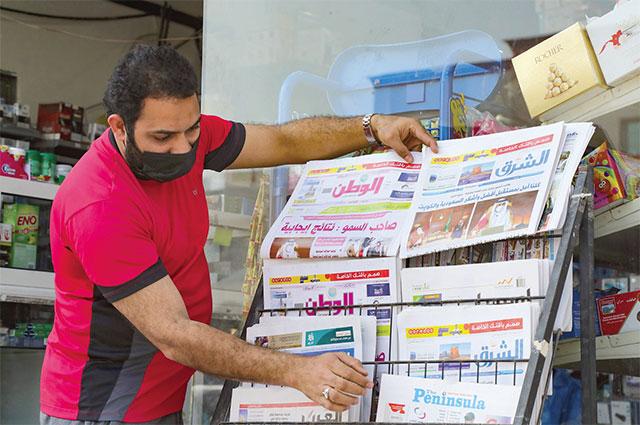You are here
Gulf's surprise reconciliation masks underlying acrimony
By AFP - Jan 06,2021 - Last updated at Jan 06,2021

A man arranges newspapers on a stand outside a shop in the Qatari capital Doha showing headlines about the summit of the six-nation Gulf Cooperation Council in the Saudi city of Al Ula, on Wednesday, which saw Qatar's relations restored with Gulf nations (AFP photo)
DOHA — Qatar has been embraced by its neighbours at a landmark summit after over three years of isolation, but the hasty reconciliation did not address underlying resentments which observers say risk resurfacing.
Saudi Arabia, the United Arab Emirates, Bahrain and Egypt in June 2017 slapped a boycott on Qatar that severed air, land and sea links with the gas-rich nation over claims it backed Islamists and was too close to Iran — charges Doha denied.
But while the Saudi-led quartet agreed to restore relations and lift the restrictions on Tuesday, the talks in the kingdom's desert city of Al Ula glossed over Qatar's cosy ties with Iran, raising the prospect of tensions erupting again between the Gulf monarchies.
Here are the most pressing questions:
What's next?
One of the first signs of the thaw was an immediate change in tone from media on both the Qatari and Saudi sides, with habitually aggressive coverage dropped in favour of complimentary tweets and commentary.
But although the border between Saudi and its smaller neighbour may open in the coming days, allowing once-lively trade and tourism to resume, other activity may be delayed due to coronavirus precautions.
"The practical provisions of the agreement are open borders and diplomatic relations in exchange for an end of any hostile [Qatari] messaging — media, social media, think tanks, and lobbyists against quartet countries," said Cinzia Bianco from the European Council for International Relations.
With regional economies seeking revitalisation after the double hit of coronavirus and an oil price slump, Qatari investments in the formerly hostile countries could follow swiftly said David Roberts, an associate professor at King's College London.
But years of bitter mud-slinging and accusations may not be quickly forgotten.
"The ideological root cause of the conflict will remain while all they do is address the symptoms," said regional analyst Andreas Krieg.
"This is dangerous as this [diplomatic] conflict can erupt again."
Friends again?
While all the boycott nations signed up to the declaration that emerged from Tuesday's summit, there have been varying levels of enthusiasm.
Bahrain, locked in a separate dispute with Doha over maritime boundaries, has held back from effusive statements.
"Bahrain et al will follow," said Roberts. "Evidently they are reluctant, but to defy the Saudi lead here would be unheard of."
The depth of the sanctions, seen by many Qataris as excessive in the closely interlinked region, means "bitterness will remain — but a new normal will resume", he added.
Wounds inflicted during the crisis could take years to heal.
Eman Alhussein, non-resident fellow at the Arab Gulf States Institute in Washington, said families divided by the crisis would likely be the first to take advantage of eased restrictions, but a restoration of links in other areas "might take time to materialise".
"The severity of the 2017 crisis took many Gulf citizens by surprise. It also underlined the element of unpredictability in the region", she said.
What about Iran?
Iran has been at the centre of the dispute as regional tensions with Tehran and its proxies escalate, notably in Yemen where Saudi Arabia and its allies are fighting a grinding war in support of the government against Houthi rebels.
Washington has intensified pressure for a resolution to the Gulf crisis to help isolate Tehran as the curtain falls on Donald Trump's Iran-hawkish presidency.
A middle ground between Doha on one side and Riyadh and Abu Dhai on the other side on this most divisive of regional topics may be hard to find.
Even "Qatar sees Iran's regional activities as dangerous and destabilising", said Royal United Services Institute analyst Tobias Borck.
But "at the same time, maintaining cordial relations with Iran, centred around the management of [their shared] gas field is absolutely and existentially essential for Qatar. So here Qatar is back to walking the tightrope".
Saudi Arabia insisted the deal meant the Gulf family would be better able to combat "the threats posed by the Iranian regime's nuclear and ballistic missile programme", while Tehran congratulated Qatar for resisting "pressure and extortion".
By Gregory Walton
Related Articles
MUSCAT — Iranian Foreign Minister Mohammad Javad Zarif will visit Qatar on Monday, officials said, for talks on relations between Tehran and
RIYADH — Qatar's emir on Tuesday skipped a Gulf summit billed as a potential "reconciliation conference", but leaders' calls for integration
ABU DHABI — The United Arab Emirates accused rival Qatar of "intercepting" two Emirati passenger planes en route to Bahrain Monday in the la

















